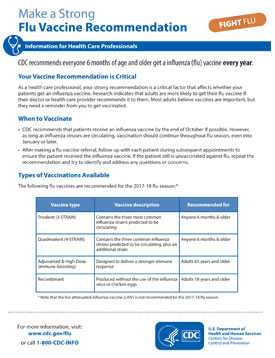Make a Strong Flu Vaccine Recommendation
CDC recommends everyone 6 months of age and older get a yearly influenza (flu) vaccine.

As a health care professional, your strong recommendation is a critical factor that affects whether your patients get an influenza vaccine. Research indicates that adults are likely to get their flu vaccine if their doctor or health care provider recommends it to them. Most adults believe vaccines are important, but they need a reminder from you to get vaccinated.
Vaccine Timing
- CDC recommends that patients receive an influenza vaccine by the end of October if possible. However, as long as influenza viruses are circulating, vaccination should continue throughout flu season, even into January or later.
- After making a flu vaccine referral, follow up with each patient during subsequent appointments to ensure the patient received the influenza vaccine. If the patient still is unvaccinated against flu, repeat the recommendation and try to identify and address any questions or concerns.

Make a Strong Vaccine Recommendation
Tips on how to make a strong flu vaccine recommendation to your patients
Factsheet [498 KB, 2 pages, 8.5″x11″]
Making a Strong Flu Vaccine Recommendation (SHARE)
It is necessary for some patients to receive a strong recommendation from their provider. CDC suggests using the SHARE method to make a strong vaccine recommendation and provide important information to help patients make informed decisions about vaccinations:
- S- SHARE the reasons why the influenza vaccine is right for the patient given his or her age, health status, lifestyle, occupation, or other risk factors.
- “This vaccine can protect you and your family from getting sick from flu. By getting the shot today, you’ll be protecting yourself and the people around you who are more vulnerable to serious flu illness, like your children and parents.”
- H- HIGHLIGHT positive experiences with influenza vaccines (personal or in your practice), as appropriate, to reinforce the benefits and strengthen confidence in flu vaccination.
- Tell your patients that CDC and you recommend they get the influenza vaccine each year.
- A- ADDRESS patient questions and any concerns about the influenza vaccine, including side effects, safety, and vaccine effectiveness in plain and understandable language.
- “A flu shot cannot cause flu illness. Flu shots are made either with flu vaccine viruses that have been ‘inactivated’, making them not infectious or with no flu vaccine viruses at all. The most common side effects of an influenza vaccine are mild, like redness, swelling, or pain in your arm where the shot was given. This should go away within a few days.”
- R- REMIND patients that influenza vaccines protect them and their loves ones from serious flu illness and flu-related complications.
- “Flu activity is going to start to pick up, and CDC says to expect more cases in the coming months. That is why I want to make sure I help protect you and your loved ones.”
- E- EXPLAIN the potential costs of getting the flu, including serious health effects, time lost (such as missing work or family obligations), and financial costs.
- “It’s important to get vaccinated this season because flu vaccination can reduce potential flu illnesses, doctor visits, and missed work and school due to flu.”
Types of Vaccinations Available
The following flu vaccines are recommended for the 2017-18 flu season:*
| Vaccine type | Vaccine description | Recommended for |
|---|---|---|
| Trivalent (3-STRAIN) | Contains the three most common influenza strains predicted to be circulating | Anyone 6 months & older |
| Quadrivalent (4-STRAIN) | Contains the three common influenza strains predicted to be circulating, plus an additional strain | Anyone 6 months & older |
| Adjuvanted & High-Dose (immune-boosting) | Designed to deliver a stronger immune response | Adults 65 years and older |
| Recombinant | Produced without the use of the influenza virus or chicken eggs | Adults 18 years and older |
* Note that the live attenuated influenza vaccine (LAIV) is not recommended for the 2017-18 flu season.
More information about available influenza vaccines and vaccine supply for the 2017-2018 season, visit Seasonal Influenza Vaccine Supply for the U.S. 2017-2018 Influenza Season.
Additional Resources
- Page last reviewed: September 20, 2017
- Page last updated: September 28, 2017
- Content source:
- Centers for Disease Control and Prevention, National Center for Immunization and Respiratory Diseases (NCIRD)
- Page maintained by: Office of the Associate Director for Communication, Digital Media Branch, Division of Public Affairs


 ShareCompartir
ShareCompartir